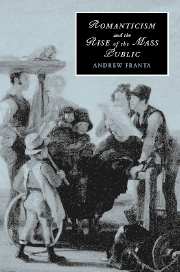Book contents
- Frontmatter
- Contents
- Acknowledgments
- Introduction: The regime of publicity
- 1 Public opinion from Burke to Byron
- 2 Wordsworth's audience problem
- 3 Keats and the review aesthetic
- 4 Shelley and the politics of political poetry
- 5 The art of printing and the law of libel
- 6 The right of private judgment
- Notes
- Bibliography
- Index
- CAMBRIDGE STUDIES IN ROMANTICISM
2 - Wordsworth's audience problem
Published online by Cambridge University Press: 22 September 2009
- Frontmatter
- Contents
- Acknowledgments
- Introduction: The regime of publicity
- 1 Public opinion from Burke to Byron
- 2 Wordsworth's audience problem
- 3 Keats and the review aesthetic
- 4 Shelley and the politics of political poetry
- 5 The art of printing and the law of libel
- 6 The right of private judgment
- Notes
- Bibliography
- Index
- CAMBRIDGE STUDIES IN ROMANTICISM
Summary
Wordsworth serves as an important point of reference throughout this study. As I indicated in the introduction, this position reflects Wordsworth's exemplary status for an influential line of Romantic criticism. From the perspective of much criticism of the Romantics, in fact, it is not too much to say that “Wordsworth” and “Romanticism” are interchangeable. More crucial than the role Wordsworth plays in the criticism of Romanticism, however, is what he came to represent to the poets who followed him and responded to his example. It is, after all, in the responses of Wordsworth's near contemporaries that we find the basis for twentieth-century reassessments of Wordsworth's poetry and politics. And, among the second-generation poets, the image of Wordsworth as apostate or egotist is widespread: Shelley makes the first charge in his sonnet “To Wordsworth” Keats writes to Richard Woodhouse of “the wordsworthian or egotistical sublime” and, as chapter 1 made clear, Byron's correspondence, prose, and poetry are littered with examples of each of these accusations (not to mention the more damning complaint that Wordsworth is simply dull).
Alongside these derogatory assessments, however, Wordsworth also stood for a particularly powerful form of sympathetic relationship between author and reader. I have already characterized this side of Wordsworth in terms of the relation to the reader established in “Tintern Abbey.”
- Type
- Chapter
- Information
- Romanticism and the Rise of the Mass Public , pp. 55 - 75Publisher: Cambridge University PressPrint publication year: 2007



